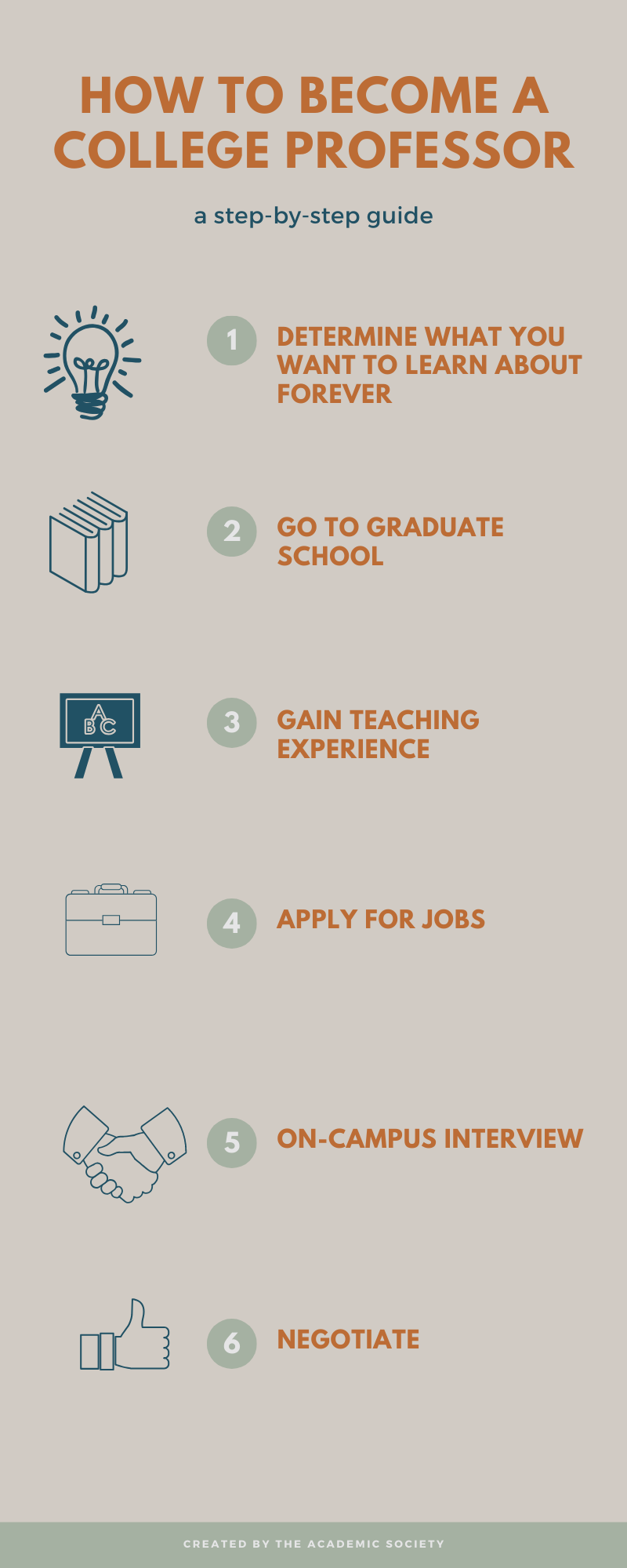How to Become a College Professor
Have you ever wondered what it takes to become a college professor? When I was a student, college professors, and academia in general, always felt so mysterious. What did my professors do when they weren’t teaching? How did they become college professors? Why is being a college professor different than teaching elementary or high school?
As a full time academic, I’ve gotten a lot of questions about what a college professor actually is as well as the process to get there. And I’ve noticed that my students are clueless about, but mostly interested in, how I came to be their instructor. In this blog post, I’ll walk you through the steps that I went through to become a college professor.
For context, I got my PhD in Mathematics in 2016 and landed my dream job as a Lecturer at a Research I University. And I love it!
So let’s get into the 6 steps for becoming a college professor! Below is a video listing out all of the steps if you’d rather watch than read.
Step 1: Figure out what you want to learn about...FOREVER.
The first step to becoming a college professor is to get an undergraduate degree in a subject that you love. Ever since I started school, math has been my favorite subject. I loved how logical and structured it was in elementary and high school. But it wasn’t until I went to college that I realized that math was more than just my favorite subject.
I genuinely enjoyed the topic and loved learning more and more about it. I wanted to learn more about math for the rest of my life. That sounds dramatic but that level of passion is necessary to complete all of the steps to become a college professor and actually love it.
So that is my first tip for you. Figure out what subject you could learn about forever. If you had to spend your whole life learning about a specific topic, what would it be?
The topic could be as specific as wanting to figure out why poverty is an issue in one particular town. Or as general as being interested in physics.
So if you have a passion for something and can see yourself learning more and more about it forever, then you have completed step one to becoming a college professor.
Related Video: A Day in the Life of a College Professor
Step 2: Go to graduate school
The next step to becoming a college professor is to find a graduate program that will facilitate you learning more about your forever topic. A lot of students choose grad schools to apply for based on how the program is nationally ranked. Rankings are good but they aren’t the most important aspect to think about, in my opinion. I recommend that you dig a little deeper when researching graduate programs.
Actually find specific professors or faculty members who are already studying what you want to study or something very closely related to what you want to study. You want to go to a graduate program that has the research area that you are interested in.
When I was applying to grad schools, I had no idea what I wanted to research. I just knew that I wanted to study math. So if you are like me, I recommend going to the school that gives you money.
Funding can be tricky in grad school. But if I had a choice between going to a school that was #1 in my field of study v. a school that would fully fund me, I would choose the school with the funding!
You don’t want to have to pay for grad school if you can avoid it. I was able to go to graduate school on a fellowship that supported people who were underrepresented in their field. In math, women are very underrepresented. So I was offered that fellowship when I was accepted into my PhD program.
Step two of becoming a college professor is to go to grad school and get a PhD. There are some college professors who teach with a Master’s degree but most schools prefer to hire PhDs as professors.
Related Video: 8 Ways to Prepare for Grad School
Step 3: Gain teaching experience
While you are in grad school, you will be taking classes, doing research, and learning from professors. And maybe you’ll do a bit of teaching, grading, and tutoring.
If you know that you want to be a college professor, my biggest recommendation is to get teaching experience while you are in grad school. This can be tricky because not every grad program allows their students to teach.
If your program does not allow their grad students to teach, I would recommend adjucting at a community college over the summer, tutoring, or getting a postdoc after you graduate to gain some teaching experience.
I was very lucky to be in a math department. Math departments are typically service departments for universities. Almost every student is required to take a math course before graduating. Therefore, we need a lot of math teachers. So most math grad students teach their own classes.
So, step three is to gain teaching experience either during grad school or after as a postdoc.
Related Video: My First Time Teaching a College Course
Step 4: Apply for Jobs
There are so many different types of jobs in academia. Here is a list of jobs that you can apply for after completing graduate school:
Professor at a research 1 institution
Professor at a liberal arts college
Professor at a community college
Lecturer
Instructor
Teaching Assistant Professor
Clinical Assistant Professor
Postdoctoral Teacher/Researcher
If you are not able to get teaching experience in grad school, I recommend applying for a postdoctoral position so that you can gain more experience in teaching as well as more research experience in your field.
Because I was able to gain so much teaching experience in grad school, I was able to skip getting a postdoc and jumped right into my career as a Lecturer, a teaching faculty member.
As I was applying for jobs, I realized that I didn’t want to be a tenure track professor. I didn’t want to have to commit to continuing my research, publishing papers, and applying for grants. My favorite part of grad school was teaching undergraduates that they could succeed in math!
So I focused my job application efforts on positions that have a heavy teaching focus. So my recommendation would be to think about the parts of grad school that you love the most and apply for jobs that align with your interests.
How to apply for a job in academia
The process to apply for all of the jobs listed above is about the same. There is a huge application process with a lot of writing involved. I highly recommend going to the writing center on your campus to help you edit and structure your application documents.
Here is a list of all of the components that must be submitted as part of a typical application packet:
Teaching Statement
Research Statement
Curriculum Vitae
Cover Letter
Letters of Recommendation (2 research, 2 teaching)
Diversity Statement
Response to School Mission
I created a free Job Application Crash Course that walks you through how to create each of these documents to help you apply for your dream job in academia.
Step 5: Interviews
After applying for college professor positions, if a school is considering hiring you, they will invite you for a Skype or phone interview. During the Skype/phone interview, you will chat with members of the search committee to see if you are a good fit for the position.
If the initial Skype/phone interview goes well, you will be invited for an on-campus interview. An on-campus interview is also an intense process to determine if you and the school are a good fit. While you are at the school, you want to figure out if you could see yourself living in that town, working with the colleagues you meet, and teaching their students.
The on-campus interview can last between 1-2 days where you meet members of the search committee, the department, and various school administrators. You will also present your research and give a teaching demonstration.
My biggest tip for the on-campus interview is to be yourself while you are there.
Related Video: 10 Tips to Nail your On-Campus Interview
Step 6: Negotiate
After your on-campus interview, if the department and school decide to hire you, they will call you and send you an offer letter stating that they want to hire you along with a proposed salary. This is your chance to negotiate.
If you’ve gotten multiple offers, you can leverage those. You can also negotiate moving costs and conference/research funding if applicable.
Then you accept the offer and that is how you become a college professor!



